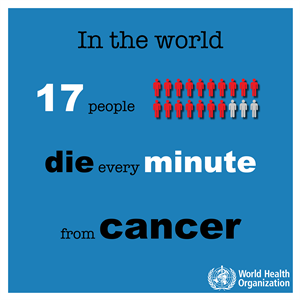World Cancer Day,
Organized by the International Cancer Federation (UICC) and celebrated every year on February 4, it is an opportunity to mobilize the international community to end the injustice from the preventable suffering of cancer.
This year’s theme acknowledges, “I can, we can.” Everyone should be able to tackle the cancer burden. We can work together to reduce cancer risk factors. We can overcome barriers to early diagnosis, treatment and palliative care. We can work together to improve cancer control and achieve goals

Global to reduce early deaths from cancer and non-communicable diseases
Global Plan of Action to Prevent and Control NCDs in 2013-2020
Noncommunicable diseases – cardiovascular diseases, cancers, chronic respiratory diseases, and diabetes – are the leading cause of death worldwide. Over 36 million die annually from non-communicable diseases (63% of global deaths), including 14 million people who died very young before the age of 70. More than 90% of these premature deaths from non-communicable diseases occur in low and middle-income countries , And it could have been largely prevented. Most premature deaths are associated with common risk factors: tobacco use, unhealthy diet, physical inactivity, and harmful use of alcohol.
To strengthen national efforts to tackle the burden of noncommunicable diseases, the Sixty-sixth World Health Assembly endorsed the WHO Global Plan of Action on the Prevention and Control of Noncommunicable Diseases 2013-2020 (Resolution WHA66.10 provided a quality action plan through the provision of the Action Plan A roadmap and list of policy options for member states, WHO, other UN organizations, intergovernmental organizations, NGOs, and the private sector, which will be achieved when implemented collectively between 2013 and 2020. No Global scorer voluntary, including the relative reduction of 25% in premature deaths from non-communicable diseases by the year 2025.
The WHO Global Plan of Action for the Control of Noncommunicable Diseases 2013-2020 is based on the commitments made by heads of State and Government in the United Nations Political Declaration on Prevention and Control of Noncommunicable Diseases (Resolution A / RES / 66/2), while acknowledging the role and responsibility The Essentials. Governments in responding to the challenge of non-communicable diseases and the important role of international cooperation in supporting national efforts
Early Diagnosis of Cancer
Early detection of cancer can reduce cancer-related deaths. In resource-poor areas, cancer is often diagnosed at a later stage of the disease, resulting in a lower survival rate, possibly increased morbidity, and higher treatment costs. Even in countries with strong health systems and services, many cancers are diagnosed late. Therefore, treatment of delays in diagnosing cancer and hard-to-reach treatment is crucial in all cancer control settings.
Early diagnosis strategies improve cancer outcomes by providing care at the earliest possible stage, and thus are an important public health strategy in all circumstances. Barriers to cancer diagnosis must first be identified and evaluated, and these factors may arise from patients to caregivers to health systems. There are three main steps to early cancer diagnosis:
Improving public awareness of the various symptoms of cancer and encouraging people to seek care when they occur;
Investing in strengthening and equipping health services and training health workers so that they can make an accurate and timely diagnosis;
Ensure that people with cancer can obtain safe and effective treatment, including pain relief, without incurring heavy personal or financial difficulties.
Effective programs can then be implemented at various levels, including community engagement, improving diagnostic and referral capacity, and ensuring access to quality treatment in a timely manner.
The WHO Early Diagnostic Guide for Cancer aims to help policy makers and program managers to facilitate timely diagnosis and improve access to cancer treatment for all.
